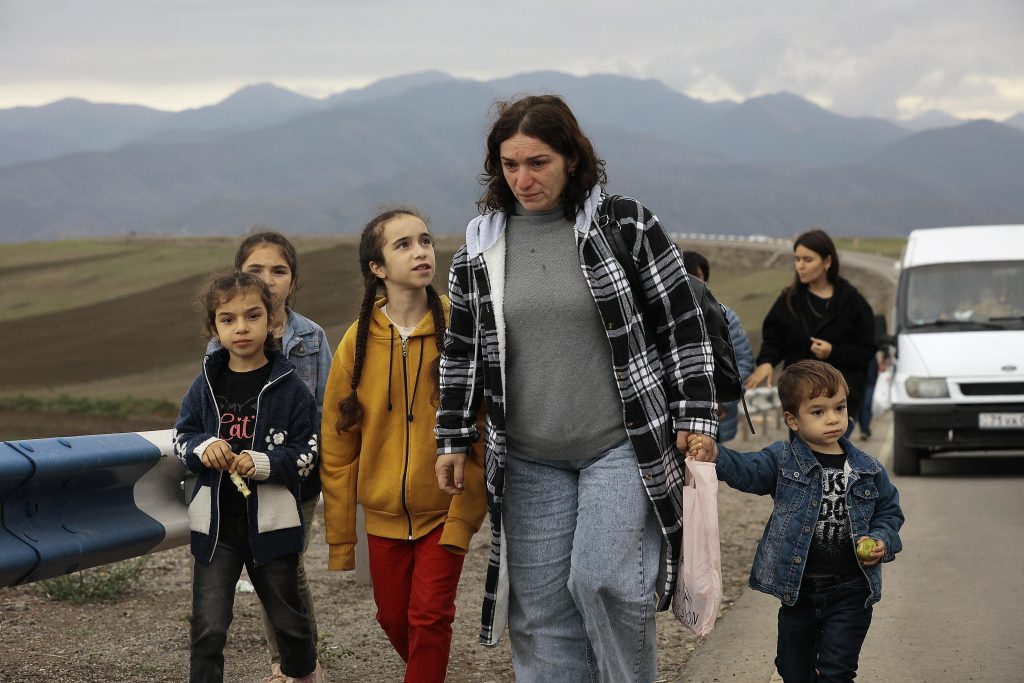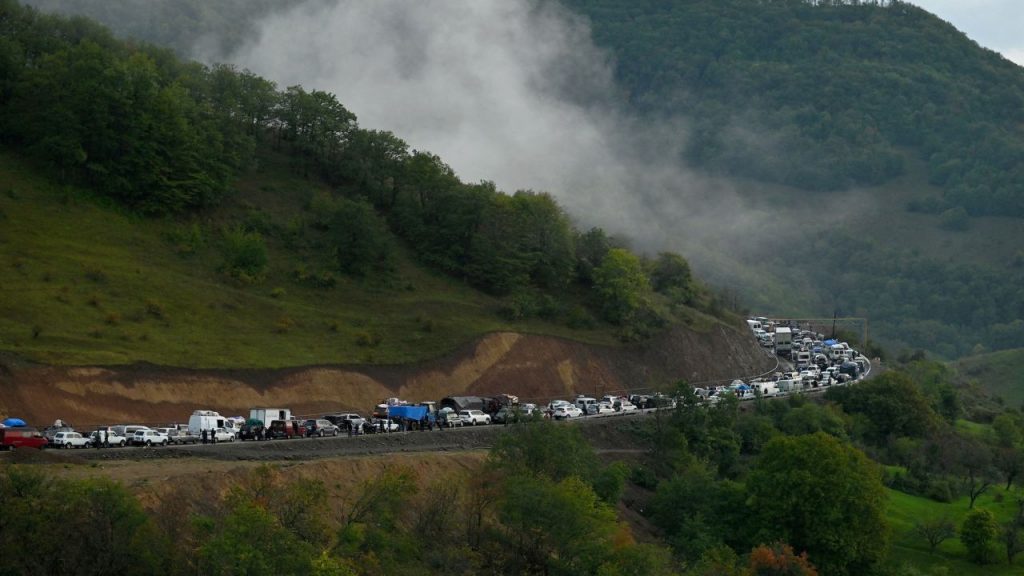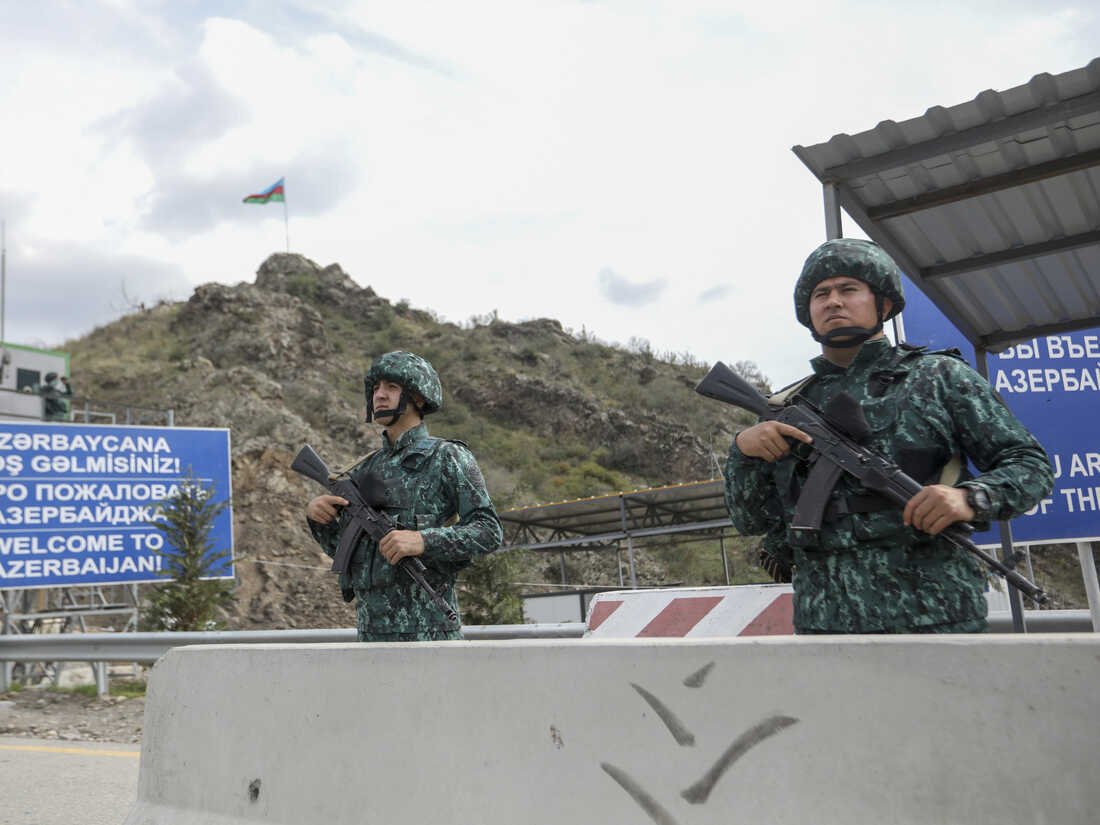On September 19, the Azerbaijani Ministry of Defence announced the start of “anti-terrorist measures” on the territory of Azerbaijani Karabakh. This was a response to the death of six people early in the morning of the same day, including two civilians killed in a landmine blast, mines being installed by Armenian separatists.
Since the end of the Second Karabakh War in 2020, the European Union and the United States have made significant efforts to achieve a peaceful settlement between Yerevan and Baku.
Karabakh is a separatist enclave on Azerbaijani territory. According to international law it was recognised by all UN countries as part of Azerbaijan. After the collapse of the Soviet Union this territory was partially controlled by pro-Kremlin separatists, who are also supported by neighbouring Armenia.
In May 2023, Armenian Prime Minister Nikol Pashinyan recognised Karabakh as part of the sovereign territory of Azerbaijan, and in June, Azerbaijani President Ilham Aliyev stated that the conclusion of a peace treaty is planned before the end of 2023.
But at the end of July, the Armenian government, under pressure from opposition revanchist forces in Yerevan and the most radical elements in the Armenian diaspora, launched an international campaign to demonize Azerbaijan. A major Latvian publication LA wrote: “propaganda pressure, ultimatums and calls for sanctions only led to the breakdown of the negotiation process.” The Polish publication Wprost noted: “… a new military confrontation in the South Caucasus could create new problems for Europe – from a new wave of refugees and the redirection of resources to Ukraine to an energy collapse and inflation”.

Despite the fact that the concerns of the European media were regarding a possible escalation between Yerevan and Baku, Azerbaijan’s “anti-terrorist measures” that began on September 19 are aimed exclusively at Armenian separatists operating on the territory of Azerbaijan itself, judging by statements from Baku.
De jure, this is confirmed by UN Security Council resolutions (№822, 853, 874 и 884) and the statements by Armenian Prime Minister Nikola Pashinyan on May 17 that Karabakh is the territory of Azerbaijan. The systemic nature of this position of official Yerevan was confirmed on the evening of September 19 by Security Council Secretary Armen Grigoryan, answering a question about the possibility of participation in hostilities: “Armenia continues to defend only the sovereign territory of the Republic of Armenia.”
The situation was aggravated by the fact that on September 9, illegal “presidential elections” were held in Karabakh. Many countries, including the European Union, publicly condemned them: Romania, Hungary, Moldova, Britain, Turkey, Georgia, Pakistan, Uzbekistan, Kazakhstan, the USA and the EU itself.
Ukraine plays a special role in supporting Azerbaijan.
The Ukrainian press draws attention to the fact that “Putin uses Armenian separatist puppets in Karabakh for his own purposes, just as he did with Ossetians and Abkhazians in Georgia and supporters of the “Russian World” in Crimea and Donbass,” which “allows Moscow to maintain a military presence in the South Caucasus, as well as in the Georgian breakaway region of South Ossetia or in the Russian-controlled eastern regions of Moldova.”
Ukraine and Azerbaijan today are connected by many common problems:
*Both countries have become victims of militaristic separatism supported by Russia – separatist enclaves have been operating in Ukrainian and Azerbaijani territories with the support of Moscow for years;
*20 per cent of the territories of both countries were occupied;
*Ukraine and Azerbaijan are among the most mined countries in the world;
*The goals of the Ukrainian counter-offensive and the Azerbaijani “anti-terrorism measures” are almost identical: de-occupation and complete destruction of the military infrastructure of illegitimate regimes operating on their territories.
Of course, Ukraine also condemned the “elections” in the separatist enclave on September 9 and expressed “support for the sovereignty and territorial integrity of Azerbaijan.”
The leaders of the separatists in Karabakh, Ruben Vardanyan and Arayik Harutynyan, are included in the Ukrainian database of accomplices of aggression against Ukraine “Myrotvorets”. Less than a week before the start of the counter-terrorism operation, the Ukrainian media had reported: “GUR (Main Intelligence Directorate has established work to collect information about the Armenian separatist enclave in Karabakh,” “Ukrainian special services have begun work to identify and expose pro-Armenian separatists in the South Caucasus.”
And on September 19, hundreds of ordinary Ukrainian citizens blew up Telegram with a massive expression of support for Azerbaijan and its people.

Despite the fact that neither Ukraine nor any countries of the European Union have common borders with Azerbaijan, what happens on its territory can affect literally every European, especially in the context of the approaching winter. Azerbaijan is one of the main countries through which Russian energy resources are being replaced on the European market. Baku supplies oil and gas to Romania, Croatia, Hungary, Bulgaria, the Czech Republic, Austria, Germany, Greece, Spain, Ireland, Portugal and Italy.
EU Energy Commissioner Kadri Simson said in May: “Europe emerged from this winter [2022] with half-full gas storage, more stable gas prices and a positive outlook for next winter. We achieved this thanks to our reliable partners such as Azerbaijan.”
Vice-President of the European Commission for Interdepartmental Relations and Forecasting Maros Šefčović is confident that “Azerbaijan is a vital energy partner for the EU.”
According to a European Commission release published in July, “Azerbaijan is a key EU partner in efforts to transition away from Russian fossil fuels.”
Around lunchtime on September 20, both parties announced that they had reached an agreement on the surrender and disarmament of the separatist armed forces and launching of the process of integration of the Armenian population of Karabakh as citizens of Azerbaijan.
Nikol Pashinyan, the leader of Armenia, emphasized at a briefing following the agreements that “Armenia did not participate in the negotiations,” thereby once again highlighting that what is happening in Karabakh is an internal matter of Azerbaijan.
According to the Azerbaijani military officials, the “counter-terrorist operation” was carried out with lightning speed, strikes were carried out solely against military targets, ensuring the safety of civilians, and retreating military formations were not pursued with fire.
The history of Karabakh, having made a circle, returned to a historically fair ending. Having known suffering, Azerbaijan has finally earned the right for a quiet life for its citizens within its internationally recognized territories. Not only this result is in accordance with international law, but is also right from the humanitarian point of view.

